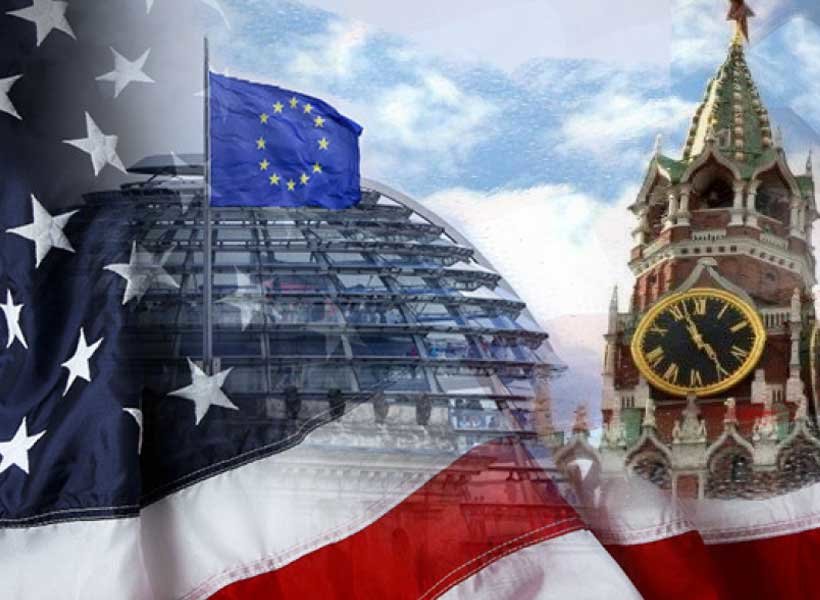Conflicts intensified between Russia and West

TEHRAN - Relations between Russia and NATO are now at the worst condition after the Cold War. "Mikhail Gorbachev", the last Soviet President, had warned about the re-start of Cold War between the White House and the Kremlin before. But now Russian officials believe that the constant and extensive conflicts between Moscow and the West leads them to much more complicated conditions than that of the Cold War time.
Meanwhile, the case of "Sergei Skripal" has only a catalytic role that adds to the speed and intensity of opposition between Russia and NATO. In other words, the "Skripal" case can't be considered as a start to the conflicts raised between Russia and the West, but it's rather the climax of such an opposition.
As reported, Sergei Skripal and his daughter, Yulia, were discovered on a bench in Salisbury in early March, with the UK claiming a Soviet-designed nerve agent was used against them. Without a proper investigation being carried out, London said it was “highly likely” that Russia was responsible for the attack and introduced sanctions against the country, including the expulsion of Russian diplomats.
Moscow has denied all accusations, decrying them as a “provocation,” and demanded proof from the British side. However, London refused to cooperate with Russia on the case, denying its consular staff access to Russian citizen Yulia Skripal and turning down the request to provide a sample of the toxic substance in question. The United States, the EU and NATO have also supported this claim in opposition to Moscow. However, Kremlin officials denied such an allegation, calling it a plot by the British to put diplomatic and psychological pressure on Moscow.
As predicted, with the intensification of the opposition between Russia and the West over the Skripal case, the conflict immediately entered the "diplomatic phase". Along with Britain, countries such as the United States, Canada, Poland, Germany, and ... expelled the Russian diplomats from their countries. In response, Russia has also expelled many of Western diplomats. The expulsion of 23 British diplomats and 60 US diplomats from Moscow, and the closure of the US Consulate General in St. Petersburg, was among the measures taken by Kremlin in this regard.
The role of Donald Trump's government in directing the Skripal case and its consequent tensions is undeniable. In the first place, Washington tried to turn the English-Russian dispute into a "NATO-Russia" conflict or a "West-Russia" dispute. Thus it perfectly defended England, and even took a firmer position than London towards the Skripal case! The British government was also fully satisfied with the role of the United States in this case. However, we are now witnessing the formation of a thorough confrontation between the West and Russia. But the main question here is whether the Skripal case is the "starting point" of Moscow's opposition to the West in 2018? Or should it be referred to as an "outstanding point"? In response to this question, we should pay attention to several subjects:
Firstly, during 2017, we have witnessed the formation of widespread conflict between Russia and NATO. As many analysts of strategic affairs emphasize, the level of disputes between Russia and the West has increased far more than the previous years, and has entered the "military phase". It's not without a reason that Russian President "Vladimir Putin" has taken a more closed position against the United States and the European Union over the past two years! The continuation of this process could lead to military confrontation (though limited) between Moscow and some European countries in the near future. In the meantime, the efforts of some European parties, such as the middle left socialist parties, have not been successful in improving the current crises.
The second point is that the Skripal case will affect the relations between Russia and Britain, and even beyond, Russia and NATO for years. The recent crisis raised between Moscow and the West is the continuation of previous extensive crises. Hence, in analyzing the Skropal case and its impact on Russia-NATO relations, we should also take the backgrounds and underlying factors into consideration. We can say that NATO is using this case to put Moscow under pressure. Meanwhile, the United States insists on maintaining tension between Russia and NATO more than others. Russia's response in the expulsion of 60 American diplomats (compared with the expulsion of 23 British diplomats) suggests that the Kremlin regards Washington, and not London, as its main opponent in this dispute.
The third point here is about the concerns of the European members of the Nato. Many European countries, under the pressure of the United States and Britain, have been forced to follow London and Washington merely because of their membership in NATO. In this equation, the EU will receive the most negative impact from the existing and future conflicts. Although the United Europe has apparently tried to improve the relations between Moscow and Washington, it should not be forgotten that many of the EU members are also NATO members at the same time. On the other hand, many European players have tied their security to NATO. Obviously, in such a situation, the conflicts raised between Russian and Europe is complicated!
Finally, the Skripal case will shade over Russia-Western relations for years. Currently there is there no sign of NATO members trying to solve this problem. The fact is players such as the United States and Britain, are rather trying to use this case in opposition to the Kremlin. However, Russia has also shown that it will use issues such as "energy" and "strengthening bilateral relations with some European countries" in the confrontation scene with the West.
